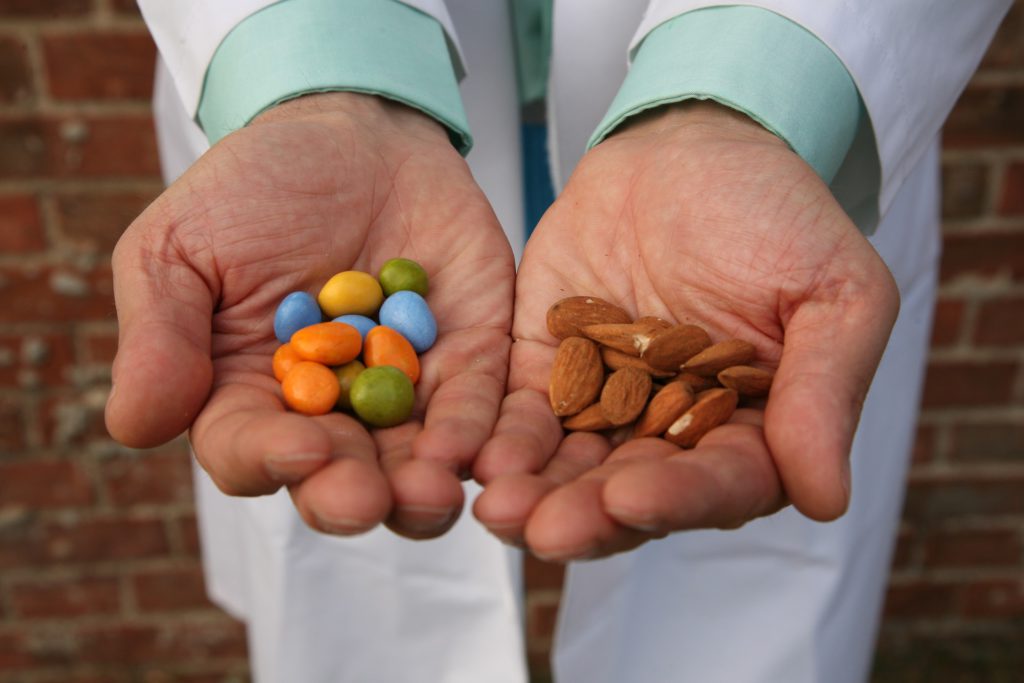The science is in. It’s official. The best diet for everyone is – drumroll please – the one you can stick with!
Keto, Low-Carb, Paleo, Whole 30, Carb-cycling, Vegetarian. I’m sure you’ve heard them all and at some point, a friend or colleague has told you what diet they are following and that you should try it too. There is a never-ending supply of diet suggestions from your favorite celebrity or Instagrammer, all touting the magic elixir or the sure-fire bet for losing weight. This onslaught of information can be overwhelming and put us into a cycle of trying one restrictive diet after another, only to lose and gain weight repeatedly. So what is the solution? How do you find an eating plan that helps you reach a healthy weight and keep it there? The key is ditching the diet mentality and finding a healthy eating style that you’re comfortable with. One that doesn’t make you feel deprived and that you can maintain for the long haul. It’s about a lifestyle change!

Yo-Yo dieting can cause long-term health issues.
Dangers of Yo-Yo Dieting
Yo-Yo dieting describes a pattern most of us have experienced at some point. It’s when our weight cycles up and down from trying one restrictive diet after another. This pattern of ups and downs is not only frustrating to our mental state, disruptive to our waistline, but studies now show it’s hard on our long-term health as well. Yo-Yo dieting causes us to lose more muscle mass over time, increases our body fat percentage, increases the risk of type 2 diabetes and heart disease, and creates a short-term thinking pattern instead of going for long-term change. Also, have you noticed after losing weight and gaining it back, it keeps getting harder to lose again? There are biological reasons for this and one of them is called leptin resistance.

Leptin resistance creates a disconnect between how this satiety hormone communicates with your brain.
Leptin, In a Nutshell
Our fat cells are always talking to our brain through a hormone called leptin. Leptin does many things and one of its roles is being our satiety hormone. It tells our brain when we’ve eaten enough and have enough fat stored. If we are carrying too much weight or continue to cycle our weight up and down, this communication between leptin and the brain gets messed up and that’s leptin resistance. It’s like that game of telephone. Leptin is telling the brain “You’ve had enough to eat, start burning more calories.” The brain hears “What? Not enough fat has been stored? Let’s slow down metabolism and eat more!”
Leptin resistance is not permanent and can be reversed. You should follow a healthy diet that is low in processed food and sugars, be physically active, and maintain a healthy weight for the long-term.
This is all great, but what diet should I follow?
As I mentioned at the beginning of this article, the best diet (I actually hate that word) to follow is the one you can stick with for years to come. Start looking at this as a marathon, not a sprint. I’m personally against removing entire food groups from our diet but I also know this is not my race, it’s yours. There is a plan out there that will work for you, you just need to find it. This is where a health coach can be of some help. It’s about discovering your values and finding what’s important to you. Learn to lean on your strengths and create doable goals that build a healthy lifestyle to serve you through your golden years.

Choose real food as often as you can.
Give Me the Basics
Keto, Whole 30, Paleo. Nutrition experts don’t agree on much when it comes to these types of restrictive diets. You will find so much conflicting information out there that it will make your head spin. That is why it’s important to choose a healthy eating plan that works for you! While the jury is out on many plans, most nutrition experts do agree on some basic fundamentals. These 4 things can help establish the basics of healthy eating. If you can follow the list below, you are well on your way to being healthy and staying there.
- Limit Processed Foods
- Try eating real, whole food as much as possible. Avoid overly processed foods like crackers, chips, cookies, pasta, bread, etc. Think twice if it comes in a box or bag. At the very least, look at the ingredients. If it looks like a novel, skip it.
- Cut Down on Added Sugar
- There are over 50 names for added sugar! Look for words that end in -ose (fructose, dextrose, glucose, etc.), things that end with -syrup (brown rice syrup, maple syrup, high-fructose corn syrup), and anything coming from fruit juices.
- Try limiting added sugars to no more than 25 grams/day. This does not include natural sugars from fruit or dairy.
- Eat More Vegetables
- Fill 1/2 of your plate with veggies and work the rainbow!
- Avoid Artificial Trans-Fats
- Read the label! Don’t trust just the nutrition numbers, look at the ingredients.
- Food companies can list 0 grams of trans fats if it has up to 0.49 grams per serving. This adds up fast considering the average person shouldn’t have more than 2 grams per day.
- Look at the ingredients and look for “hydrogenated oil”. If you see it, skip it.
In Summary
So there you have it. The best diet for you is the one you can follow for years to come. One that keeps you at a healthy weight and provides all the vitamins and nutrients you need for a long and happy life. If you are still frustrated and need help finding that plan, I would love to work with you! I know together we can find a happy place when it comes to food and health. Fill out the form below so we can set up a 15-minute mini-session. We’ll see if we are a good fit and find out if a health coach is just the thing you need to get you started on the right foot.



